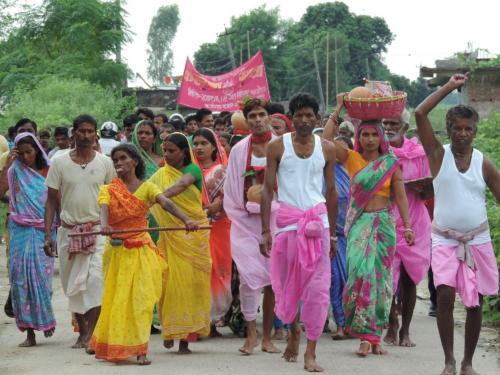
Last year I spent a “tame” Dashain in Chitwan at the home of my adopted daughter Shova Subedi and her family. Given that I’m now working in Siraha I wanted to experience what it was like to celebrate Dashain in the Terai. I have to say that I was quite overwhelmed by what I saw and captured through both photos and video.
Women and girls, dressed in beautiful saris, from a number of villages in the Karjanha VDC area walked barefoot, at least 10+ km, back and forth to the Kamala River, where some bathed, said prayers, played and collected water for the urns which they carried on their heads. Many men and children rode in front of the women/girls in carts pulled by tractors.
One thing that struck me was the fact that men seemed to be “controlling” the pilgrimage to the Kamala River, by leading through moving vehicles and for those men walking/riding cycles, keeping the women in line. There was even a point on the shores of the River where men were preventing women from temporarily returning to their village as they wanted, I suppose, to keep them organized. There were also a number of men/boys marching together with the women/girls, although they were usually in front.
Something else I observed was how people from specific villages stayed together and didn’t mingle. My feeling was that there was great potential in this mass of people marching together. The question for me became one of how to take the power of the Dashain celebration and seeming togetherness and harness this into a movement which has the power to create change for the area that I am working in.
Dashain seemed to help people to focus on their common wanting to celebrate and pray. I’m not sure but I wonder if caste disappears in all of this? However after the Karjanha villagers came back from their walk to the River, juice was given quite chaotically to people in plastic cups. These were thrown all over the ground including the area where the local mandir sits across from Phul Kumari Mahato Memorial Hospital.
The people passing out the juice and other vendors located near them did not have any dust bins. I found a bag to put the garbage in however when I asked people to help me, many responded by running the other way. (Fortunately a number of children who I’ve befriended did help). Is this a matter of caste in that only some people pick up garbage or is it just a matter of that people don’t care, that someone else can or maybe nobody will clean up the area near the mandir? Are people afraid of their neighbors seeing them pick up garbage and caring what they might think?
Social movements/change is built on people having a common issue(s) which they consider so important that they are willing to come together and take action. But often people don’t because they are only concerned about themselves and possibly their own families. People often prefer the comfortableness of their lives, no matter how uncomfortable they really are.
How might the spirit of Dashain then be used for change purposes? Certainly if people can come together to walk a number of kilometers in their bare feet to pray they can come together for the common good, e.g. keeping a village clean, properly educating children, helping to overcome health disparities, etc. Unfortunately this doesn’t play out that easily and there is a huge disconnect. Bridging the gap between coming together to walk in large numbers to the Kamala River and keeping one’s village clean in reality is not that great.
If somehow we could keep the spirit of Dashain alive throughout the year, people might really become empowered to work collaboratively towards positive change not only for themselves but also their friends and neighbors. For me this becomes a good lesson in how to be a community change agent.










Add new comment